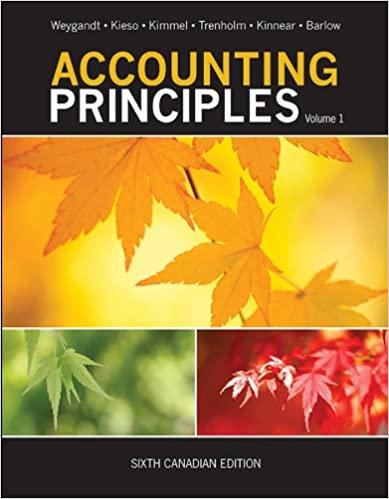Pure Water Systems Inc. (PWS) is a Canadian public company. On December 31, 2018, PWS acquired common shares of Sweet Water Corp. (SWC). Below are three independent questions based on different scenarios for the number of shares acquired and how the shares are acquired. All the scenarios share the same initial financial data. SWC's comparative statement of financial position as at December 31, 2019, and its statement of comprehensive income for the year ended December 31, 2019 are as follows: Sweet Water Corp. Statement of financial position As at December 31 (in '000s) 2019 2018 Cash $ 479 $ 185 Accounts & other receivables 635 Inventory 460 345 Note receivable 100 0 Land 450 500 Building (net) 294 310 Equipment (net) 478 420 Patent 80 100 Total assets $2.976 $2.380 Accounts payable & accrued liabilities $ 480 $ 460 Long-term debt 900 Common shares 500 500 Retained earnings 1,096 520 Total liabilities and equity $2.976 $2.380 520 900 Sweet Water Corp. Statement of comprehensive income For the year ended December 31, 2019 (in '000s) Sales revenue Cost of goods sold Gross profit Sales, general and admin expenses Interest expense Depreciation and amortization expense $3,160 1.208 1,952 626 45 68 1213 Other income Earnings before income tax expense Income tax expense Net income 1.293 517 $ 776 The fair value of each of SWC's identifiable net assets at time of acquisition is as follows: (in $000s) (Assume that all assets have no residual values at the end of their useful lives.) Estimated Fair value remaining useful Dec. 31, 2018 life/years to maturity Inventory $315 NA Land $525 NA Building (net) $380 20 years Equipment (net) $390 10 years Patent $200 5 years Long-term debt $910 4 years Additional information: 1. Both companies pay income tax at a rate of 40%. 2. Both companies use the straight-line method of depreciation and both companies use first in, first out (FIFO) to value their inventories. 3. Assume any fair value difference on the long-term debt is amortized using the straight-line method. 4. PWS established that SWC is a cash-generating unit (CGU) subject to impairment testing. 5. On June 30, 2019, SWC sold land to PWS for $130,000. SWC's net book value at time of sale was $50,000, which was the same as the estimated fair value at acquisition date of the associate. In consideration of the transfer, PWS paid $30,000 cash and signed a note payable to SWC for the $100,000 balance. The note is payable in full on June 30, 2024. Interest at 5% is payable annually with the first payment due on June 30, 2020. 6. During 2019, PWS sold goods to SWC for $120,000 including a 30% gross profit margin: 40% of these goods remained unsold by SWC as at December 31, 2019 7. During 2019, SWC sold goods to PWS for $170,000 including a 50% gross profit margin: 10% of these goods remained unsold by PWS as at December 31, 2019 8. During 2019, SWC incurred management fee expense from PWs at a total cost of $25,000. Thisamount remained unpaid at year end. SWC recorded this as an SG&A expense while PWS recorded it as other income 9. On September 1, 2019, PWS sold equipment to SWC for $100.000 cash. PWS's carrying value of the equipment, which had a remaining useful life of ten years, was $90,000. The gain was recorded in other income. 10. Both PWS and SWC paid dividends during the year ended December 31, 2019 11.PWS and SWC only prepare adjusting entries at year end. QUESTION #1 (10 Marks) Assume that on December 31, 2018, PWS paid $1,300,000 cash to acquire 100% of the net assets of SWC. Required: a) Calculate and allocate the acquisition differential including determination of the goodwill arising on the acquisition of the net assets of SWC. (5 marks) b) Prepare PWS's journal entry to record the acquisition. Support the journal entry with a brief explanation as to its nature









